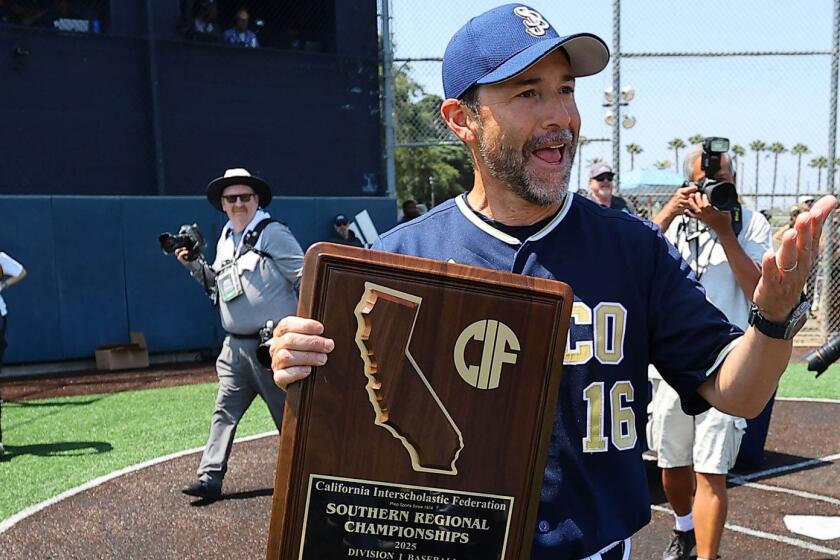Winning Ways Earn District Respect
- Share via
ATLANTA — Back home, the Los Angeles Unified School District gets about as much respect as the woebegone L.A. Clippers basketball team. But here at the national academic decathlon finals, the school district is treated more like the Chicago Bulls, a mighty power to be reckoned with.
In the same way the Bulls have created a dynasty that now dominates pro basketball, the LAUSD has produced so many winning academic decathlon teams that when the kids from El Camino Real High School in Woodland Hills arrived in Atlanta this week to vie for the national title, their competitors quaked.
“California is certainly the team we fear the most,” acknowledged Richard Golenko, coach of the highly regarded team from J. Frank Dobie High School in Houston, Texas.
“Having provided the national champions for the last two consecutive years, its record speaks for itself.”
Of course, the irony that the embattled district, which has a dropout rate nearing 40%, has to fly its students practically across the country to get respect is not lost on its administrators.
“This event means a great deal to us,” said Dan Isaacs, the LAUSD’s assistant superintendent for school operations. “It reflects that our kids can compete with anyone in the country and excel.”
Indeed, the LAUSD has sent a record eight teams to represent California in the United States Academic Decathlon competition, four of which went on to capture the national title.
In theory, any of the more than 40 teams from across the state that compete in the annual California Academic Decathlon have a shot at winning the state title and advancing to the national finals.
But in reality, teams from three Los Angeles high schools--John Marshall, Taft and El Camino Real--have dominated the state event during the last decade, gaining berth after berth in the national contest.
So just how does a district best known locally for its low student test scores and campus violence manage to pull it off?
“The bad elements may be worse in Los Angeles, but the trade-off is that the good elements are just that much better,” explains Dale Shuger, a member of El Camino’s academic decathlon team.
“But it’s usually only the bad kids that make it into the paper, not the good ones.”
Isaacs points to a strong tradition among Los Angeles teams of setting their sights on reaching the national contest. It’s an ambition, he says, fueled by hundreds of teachers, students and parents from across he district who dedicate thousands of hours each year to preparing teams.
As a result, when California squads, particularly those from the Los Angeles district, arrive at the national finals, they are revered by their competitors, some of whom are shocked to learn that the LAUSD has such a bad rep back at home.
“I’m surprised because they always produce such competitive teams,” Golenko said.
Other teams have a distinct reaction when they spot the kids in the sharp blue satin jackets embroidered with a quote from Great Britain’s World War II leader, Winston Churchill: “Victory, however long and hard the road may be!”
“When they have their jackets on, people will come up and say ‘Oh, you’re El Camino,’ ” said Sharon Markenson, the team’s co-coach. “You can see it in their faces” that they’re the team to beat, she said.
In fact, if you ask just about anyone involved in the competition who the favored teams are, it’s almost a given they’ll rattle off the Golden State squad as being among the top contenders.
“California, Texas and Illinois,” said Michael Bates, who coaches a team from Spartanburg, S.C. “They’re always the three heavyweights.”
This year will be a rematch of sorts as El Camino returns for its second shot at the national title, again vying with Golenko’s team from Houston. The teams began a running rivalry in 1992 when Golenko’s team captured the championship and El Camino came in fourth.
El Camino’s head coach David Roberson introduced himself to the Houston team after he spotted them Friday in the hotel where some decathlon events are held.
“We’re scared to death of them,” Roberson quipped. “I saw them on the elevator and they look like sharks, but they seem like nice kids.”
Roberson’s introduction was a pleasant, but unexpected surprise for the Dobie High team members, who moments afterward scurried up to their hotel room to report the incident to Golenko.
“We’re worried about all the teams, but our primary interest has been California because of their high test scores,” said Jeff Dorough, a member of the Dobie team.
Following the state competitions this spring, the two schools faxed each other their point totals, with Texas coming out just slightly ahead with a score of 49,926, compared to El Camino’s 49,239.
“It’s almost a dead heat,” said Golenko, whose team members carried plastic peaches throughout the year to remind them that their goal was to make it to Atlanta. “It’s going to be very close.”
Other top-notch teams competing at the three-day event include Mountain View High School from Mesa, Ariz., and Whitney Young High School of Chicago.
“These schools are tough,” acknowledged El Camino’s coach Roberson. “You blink and they’re going to blow you out, but we feel we’re ready to take them on.”
This year’s contest, which began Friday with speech and essay tests, will climax today with the annual Super Quiz event, a rowdy affair at which parents and teachers cheer on students in a college bowl-type setting.
The winner of the 10-event competition, which this year focuses on questions about the United Nations, will be announced Sunday at an awards banquet.
More to Read
Get our high school sports newsletter
Prep Rally is devoted to the SoCal high school sports experience, bringing you scores, stories and a behind-the-scenes look at what makes prep sports so popular.
You may occasionally receive promotional content from the Los Angeles Times.






